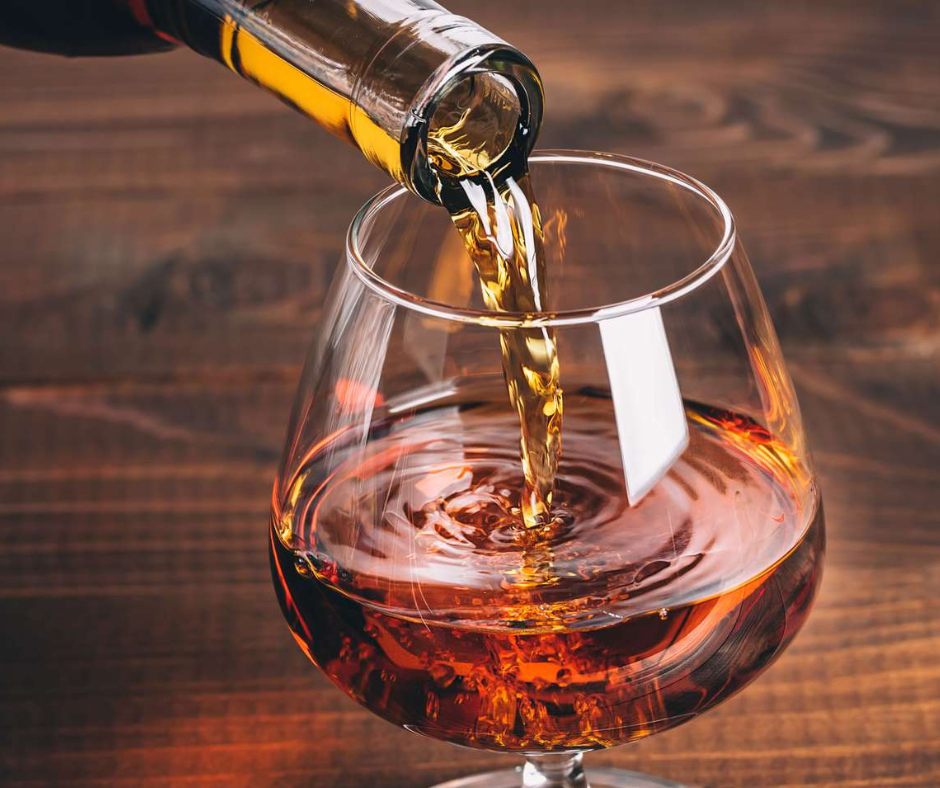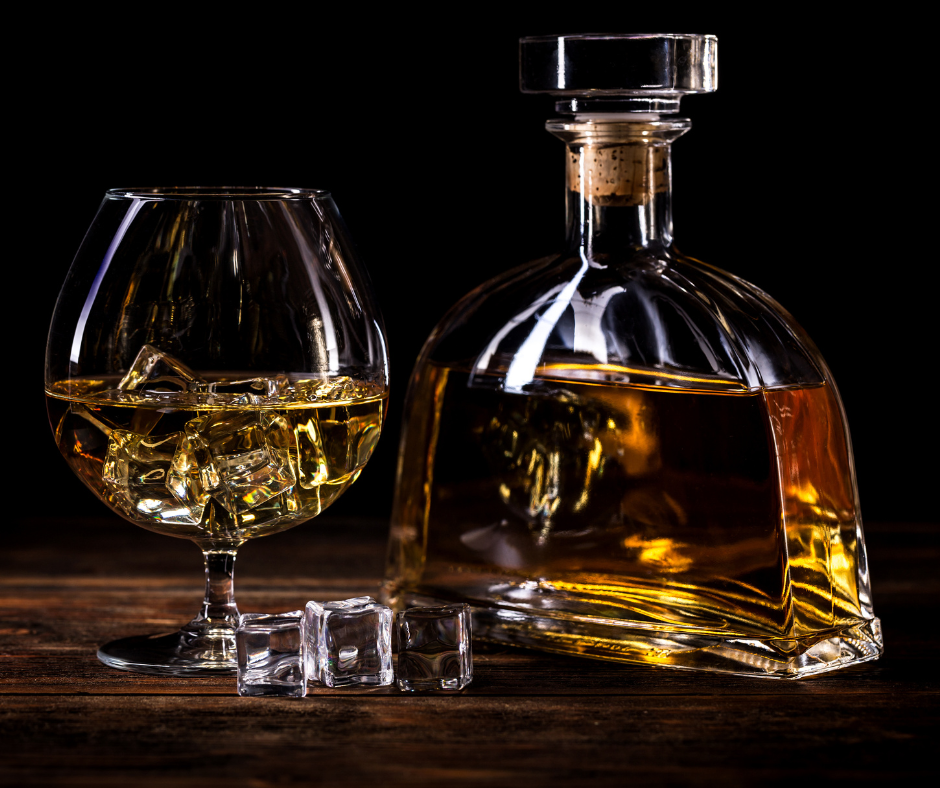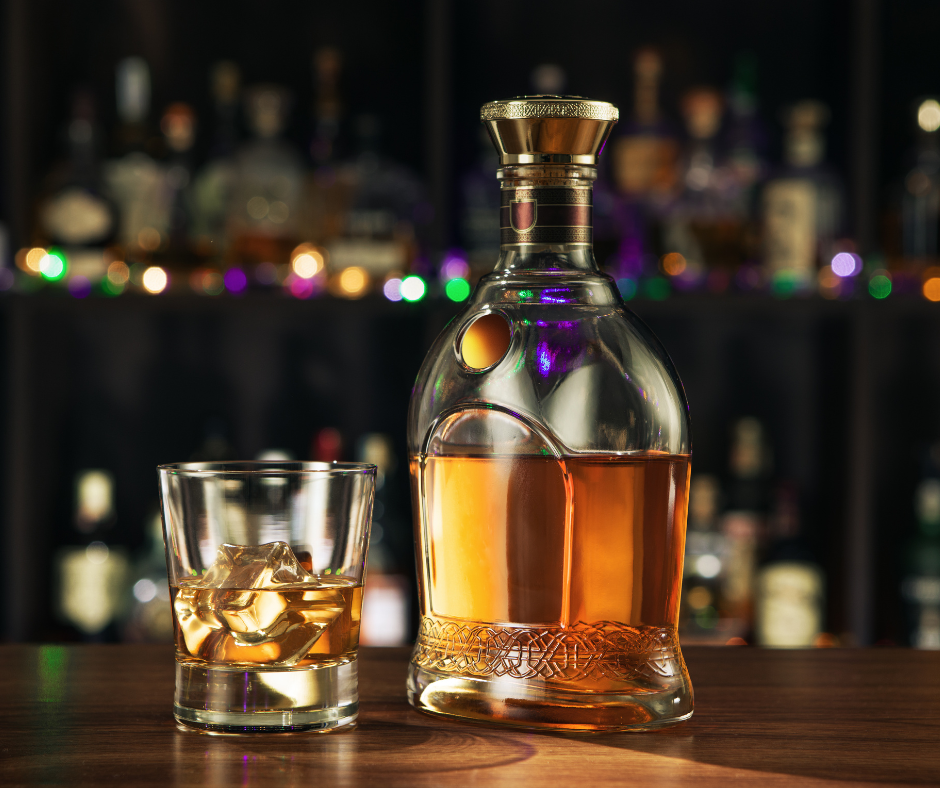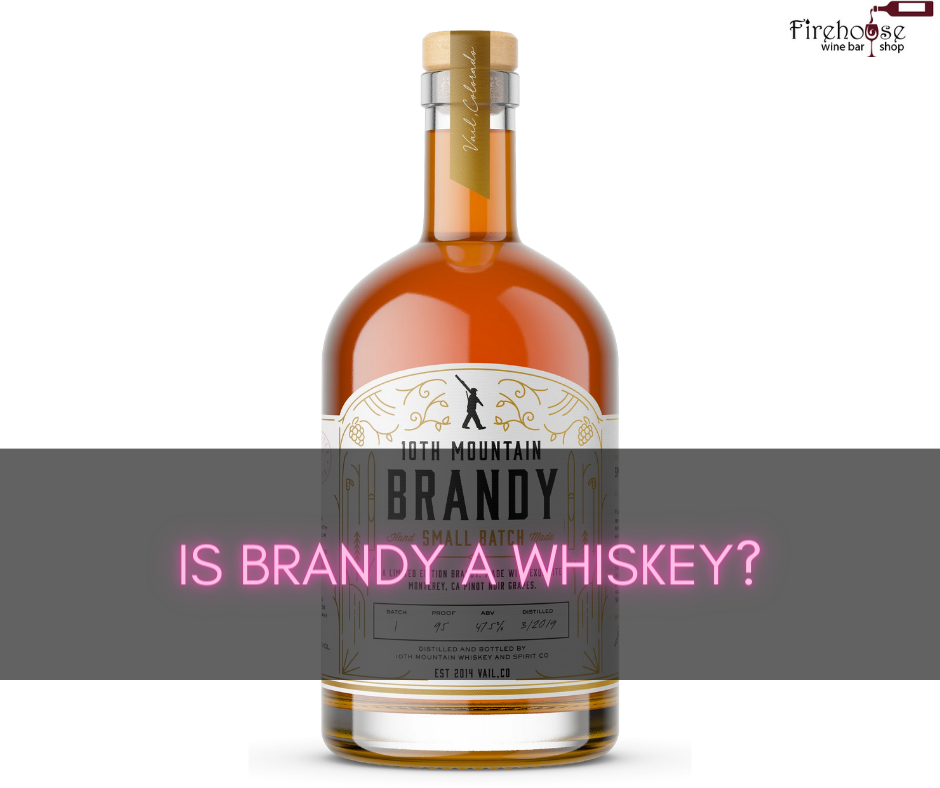Introduction
Brandy and Whiskey are two popular distilled spirits that connoisseurs and casual drinkers have enjoyed for centuries. But Is Brandy A Whiskey? While they may share some similarities, such as being distilled and aged in oak barrels, distinct differences set them apart. Understanding these differences is important, allowing individuals to make informed choices based on personal preferences and tastes.
Is Brandy A Whiskey?
Brandy is a spirit typically made by distilling wine or fermented fruit juice. It is known for its smoothness and light fruity flavor. Brandy can be produced from various fruits, including grapes, apples, and pears, resulting in various flavors and aromas. Common types of brandy include Cognac, Armagnac, and American brandy.
On the other hand, Whiskey is a spirit made from fermented grain mash, including barley, corn, rye, or wheat. The grains are typically malted, mashed, and aged in oak barrels. Whiskey is known for its robust and often smoky flavor profile, with variations such as Scotch, Irish Whiskey, bourbon, and rye whiskey.
Importance Of Distinguishing Between The Two Spirits
Distinguishing between brandy and Whiskey is crucial for enthusiasts and those new to spirits. Understanding each spirit’s characteristics and unique qualities allows individuals to make choices that align with their preferences and desired drinking experience.
For example, someone who enjoys the smooth and fruity flavors of brandy might prefer it as a sipping drink or as a key ingredient in cocktails such as a Brandy Alexander or a Sidecar. On the other hand, whiskey enthusiasts might appreciate the complexity and bold flavors of different whiskey styles, whether sipping it neat or using it as the base for classic cocktails like an Old Fashioned or a Whiskey Sour.
In conclusion, while brandy and Whiskey may share some similarities in distillation and aging processes, their distinct characteristics make them stand out. Distinguishing between the two allows individuals to make informed choices based on personal taste and preferences, ensuring a more enjoyable and tailored drinking experience.

Types And Production Process
Different Types Of Brandy
Brandy, a popular distilled spirit, comes in various types that showcase different fruits’ diverse flavors and aromas. Here are some of the most well-known types of brandy:
- Cognac: Originating from the Cognac region in France, Cognac is regarded as the pinnacle of brandy. It is double distilled using specific grapes, primarily Ugni Blanc, and undergoes a lengthy aging process in oak barrels. Cognac is known for its rich and complex flavors with notes of dried fruit, vanilla, and oak.
- Armagnac: Produced in the Armagnac region of France, Armagnac is another esteemed variety of brandy. It is made from a wider range of grapes than Cognac, including Ugni Blanc, Baco Blanc, and Colombard. Armagnac has a more rustic and earthy character, with prunes, spice, and caramel flavors.
- American Brandy: In the United States, American brandy encompasses a range of styles. California brandy is particularly notable, often made from grapes like Chardonnay and aged in oak barrels to develop fruity and smooth flavors. American brandy can also be produced from other fruits, such as apples or cherries, resulting in unique and diverse profiles.
Different Types Of Whiskey
With its rich history and cultural significance, Whiskey offers various flavors and styles. Here are some of the different types of Whiskey:
- Scotch Whisky: Hailing from Scotland, Scotch whisky is made primarily from malted barley and is known for its smoky and peaty qualities. It undergoes a specific distillation process and must be aged in oak barrels for at least three years. Depending on the region it comes from, Scotch whisky can have various flavor profiles, ranging from light and floral to robust and full-bodied.
- Irish Whiskey: Irish Whiskey is typically triple distilled and made from a mixture of malted and unmalted barley. It is known for its smoothness and subtle flavors, often incorporating honey, vanilla, and fruit notes. Irish Whiskey can be enjoyed neat, on the rocks, or as a component in classic cocktails.
- Bourbon: Native to the United States, bourbon is made primarily from corn and must be aged in new charred oak barrels. It is known for its bold and sweet flavors, including caramel, vanilla, and oak hints. Bourbon has a distinct character and is a staple in American whiskey culture.
- Rye Whiskey: Rye whiskey is made primarily from rye grain and has a spicier flavor than Bourbon or Scotch whisky. It offers a range of notes such as pepper, cinnamon, and cloves. Rye whiskey has grown in popularity recently, with bartenders utilizing its unique flavor profile in craft cocktails.
In conclusion, brandy and Whiskey’s distinct types and production processes contribute to their characteristics and flavors. Exploring the diverse offerings within each category allows enthusiasts to appreciate the nuances and complexities of these beloved spirits. Whether one prefers the light and fruity elegance of brandy or the bold and robust nature of Whiskey, there is a unique experience to be found with each sip.
Flavor Profiles
Distinctive Flavors Of Brandy
With its sweet and fruity essence, Brandy often reveals flavors of dried fruits, nuts, and occasionally floral undertones. The base, whether grape, apple, or other fruits, contributes to the unique flavor profile of each type of brandy. Cognac, the pinnacle of brandy, is renowned for its rich and complex flavors. Due to its specific grape selection and the lengthy aging process in oak barrels, it exhibits notes of dried fruit, vanilla, and oak.
On the other hand, Armagnac offers a more rustic and earthy character with prunes, spice, and caramel flavors. American brandy showcases diversity, with California brandy highlighting fruity and smooth flavors crafted from grapes like Chardonnay.
Distinctive Flavors Of Whiskey
Whiskey, stemming from Gaelic tradition and local folk practices, presents various flavors and styles. Scotch whisky, originating from Scotland, is known for its smoky and peaty qualities, achieved through malted barley and specific distillation processes. Irish Whiskey, often triple distilled and made from a mixture of malted and unmalted barley, offers smoothness and subtle flavors with notes of honey, vanilla, and fruit. Bourbon, native to the United States, features bold and sweet flavors, including hints of caramel, vanilla, and oak. Rye whiskey, primarily made from rye grain, has a spicier flavor profile with notes of pepper, cinnamon, and cloves.
In conclusion, brandy and Whiskey have distinctive flavor profiles that reflect their production processes and ingredients. Brandy’s sweetness and fruitiness and the flavors of dried fruits and nuts create a light and elegant drinking experience.
On the other hand, Whiskey showcases bolder flavors and complexities, from the smoky and peaty qualities of Scotch whisky to the spiciness of rye whiskey. Exploring the diverse offerings within each category allows enthusiasts to appreciate these beloved spirits’ unique and nuanced characteristics truly. Whether one prefers the fruity symphony of brandy or the robust nature of Whiskey, both offer a sensory journey through their distinct flavor profiles.
Aging And Maturation
Aging Process Of Brandy
Much like a child matures over time, brandy and other aged spirits become more refined as they spend years resting in a barrel. The goal of maturation in brandy production is to remove harsh flavors from the raw alcohol while adding distinct flavor characteristics found in the barrel’s wood. Most brandies are matured for three to five years, but some remain for as long as 20 to 40 years or even longer.
Brandy aging typically occurs in oak barrels, sometimes charred to enhance flavor. The type of wood used plays a significant role in determining the final flavor profile of the brandy. Oak imparts vanilla, spice, and caramel flavors to the spirit, while other woods may contain different nuances.
Brandy undergoes a gradual oxidation process during aging, allowing the flavors to mellow and harmonize. The spirit absorbs compounds from the wood, such as tannins and lignins, contributing to its complexity. Over time, the harsh alcohol flavors are smoothed out, allowing the development of rich and nuanced flavors that define a well-aged brandy.
Aging Process Of Whiskey
Similar to brandy, Whiskey also benefits from aging and maturation. Whiskey is typically aged in oak barrels, often charred to enhance the flavor. The aging process allows the Whiskey to mellow and develop its distinctive character.
The whiskey maturation involves the slow extraction of compounds from the wood, such as lignins and hemicellulose, contributing to the flavors. The type of wood used, predominantly oak, plays a crucial role in determining the final taste profile of the Whiskey.
As whiskey ages, it undergoes complex chemical reactions that transform its flavors. The harsh alcohol flavors gradually subside, allowing the Whiskey’s unique characteristics to shine. In addition to the flavors derived from the wood, other factors like the grain used in production and the specific aging conditions also influence the final product’s taste.
Whether it’s the smoky and peaty notes of Scotch whisky or the bold and sweet flavors of bourbon, aging plays a vital role in shaping the distinct flavor profiles of different types of Whiskey. The longer the aging process, the more time the Whiskey has to acquire complexity and depth of flavor.
In conclusion, aging and maturation significantly impact the flavor profiles of brandy and Whiskey. Both spirits rely on the characteristics of the wood and the gradual development of flavors over time. Whether it’s the elegance of a well-aged brandy or the complexity of an aged whiskey, the art of aging contributes to the refinement and distinctiveness of these beloved spirits.

Serving
Regarding spirits, brandy, and Whiskey are two distinct choices with unique characteristics. Understanding the differences can help you make informed decisions when serving and enjoying these beloved drinks.
Best Ways To Serve And Enjoy Brandy
Brandy is often associated with elegance and sophistication. To fully appreciate its flavor profile, it is important to serve brandy correctly. Here are some tips on how to serve and enjoy brandy:
- Glassware: Choose a tulip-shaped glass or a snifter. These styles of glassware allow the aromas of the brandy to concentrate and enhance the tasting experience.
- Temperature: Brandy is best served at room temperature or slightly warmed if desired. This allows the flavors and aromas to be fully developed and appreciated.
- Pairings: Brandy pairs well with rich, indulgent flavors. Consider pairing it with dark chocolate, cheese, or dried fruits to complement the richness of the spirit.
- Tasting flight: Offering a variety of brandies in a tasting flight allows your guests to explore different brands and flavor profiles. This can be a fun and educational experience for brandy enthusiasts.
Best Ways To Serve And Enjoy Whiskey
On the other hand, Whiskey is known for its versatility and depth of flavors. Here are some tips on how to serve and enjoy Whiskey:
- Glassware: Use a tulip-shaped glass or a whiskey tumbler. These glasses allow the aromas to be captured and the flavors to be concentrated.
- Temperature: Whiskey is typically served neat or with a few drops of water, depending on personal preference. The ideal serving temperature is slightly below room temperature, as it allows the flavors to shine without being too overpowering.
- Pairings: Whiskey pairs well with various flavors, from smoky and savory to sweet and fruity. Try pairing Whiskey with foods such as smoked meats, dark chocolate, or citrus-based desserts to find your preferred combination.
- Tasting flight: Similar to brandy, offering a whiskey-tasting flight allows guests to compare and contrast different types and styles of Whiskey. This can be an enjoyable and educational experience for whiskey enthusiasts.
Considering these serving and pairing recommendations, you can ensure your guests have a memorable and enjoyable experience when indulging in brandy or Whiskey. Personal preferences vary, so offering various options and encouraging your guests to explore and discover their favorite flavors is important.
Popular Brands
Well-known Brandy Brands
Regarding brandy, several well-known brands have made a name for themselves in the world of spirits. Here are a few:
- Hennessy: Hennessy is one of the world’s most recognized and respected brandy brands. Known for its smooth and rich flavor, Hennessy has become synonymous with luxury and prestige.
- Rémy Martin: Rémy Martin is another popular brand producing high-quality cognacs. With a rich history dating back to 1724, Rémy Martin is known for its exceptional craftsmanship and dedication to creating top-notch brandies.
- Courvoisier: Courvoisier is a brand that has been producing fine brandy for over 200 years. With a commitment to tradition and craftsmanship, Courvoisier has created a range of brandy that many enthusiasts worldwide love.
Well-known Whiskey Brands
Whiskey is also a spirit with many well-known and respected brands. Here are a few examples:
- Jack Daniel’s: Jack Daniel’s is perhaps one of the most iconic whiskey brands in the world. Jack Daniel’s has become a staple in many liquor cabinets with its signature charcoal filtering process and distinctive mellow flavor.
- Jameson: Jameson is an Irish whiskey brand known for its smooth and approachable taste. With a triple distillation process and a combination of malted and unmalted barley, Jameson has developed a loyal following of whiskey enthusiasts.
- Johnnie Walker: Johnnie Walker is a Scotch whiskey brand revered for its quality and craftsmanship. With a range of different blends and expressions, Johnnie Walker offers whiskey lovers a variety of options to choose from.
These are just a few examples of the well-known brandy and whiskey brands that have gained popularity and recognition in the spirits industry. Whether you’re a fan of brandy or Whiskey, there are countless brands and expressions to explore and enjoy.
Mixology
Brandy-based Cocktails
Brandy is a versatile spirit that can be enjoyed independently or used as the base for various cocktails. Its light fruity flavor adds a touch of sweetness and complexity to drinks. Here are a few popular brandy-based cocktails:
- Sidecar: This classic cocktail combines brandy, orange liqueur, and lemon juice. It’s a refreshing and tangy drink with a perfect balance of sweetness and tartness.
- Brandy Alexander: Made with brandy, crème de cacao, and cream, this creamy and indulgent cocktail is like a dessert in a glass. It’s ideal for sipping after a meal or on a cozy evening.
- French Connection: This simple yet elegant cocktail combines brandy and amaretto. It’s a smooth and nutty drink with a touch of sweetness.
Whiskey-based Cocktails
On the other hand, Whiskey is a bold and robust spirit that brings warmth and depth to cocktails. Its strong taste pairs well with a variety of flavors. Here are a few popular whiskey-based cocktails:
- Old Fashioned: This classic cocktail is made by muddling sugar with bitters, adding Whiskey, and garnishing with an orange twist. It’s a timeless drink that perfectly showcases the rich flavors of Whiskey.
- Whiskey Sour: Made with Whiskey, lemon juice, and simple syrup, this cocktail is tangy and refreshing. It has a perfect balance of sweetness and acidity.
- Manhattan: This sophisticated cocktail combines Whiskey, sweet vermouth, and bitters. It’s a smooth and sophisticated drink with a hint of sweetness.
While brandy-based cocktails tend to have a lighter and fruitier flavor profile, whiskey-based cocktails offer a stronger and bolder taste. Whether you prefer the subtle nuances of brandy or the robustness of Whiskey, there’s a cocktail that suits every palate.
In conclusion, distinguishing between brandy and Whiskey comes down to personal preference. Both spirits have unique characteristics and can be enjoyed in various ways. Whether you gravitate towards the light and fruity notes of brandy or the robust whiskey flavors, there’s no shortage of options when crafting delicious cocktails. Cheers!

Health Benefits And Considerations
Potential Health Benefits Of Brandy
Brandy may offer potential health benefits, particularly the one distilled from red wine. Red wine contains antioxidants, such as resveratrol, which have been linked to cardiovascular health. When red wine is distilled into brandy, some of these antioxidants may be retained, potentially benefitting those who consume it in moderation.
Although in smaller amounts than red wine, antioxidants in brandy may help protect against oxidative stress and inflammation, which can contribute to developing chronic diseases. Some studies have suggested that moderate brandy consumption, as part of a balanced diet, may be associated with a reduced risk of cardiovascular diseases.
However, it’s important to note that any potential health benefits of brandy must be weighed against the risks associated with alcohol consumption. Excessive consumption of brandy or any alcoholic beverage can lead to serious health problems, including liver damage, addiction, and an increased risk of accidents and injuries. It is crucial to consume brandy responsibly and in moderation.
Potential Health Benefits Of Whiskey
Whiskey, like brandy, may offer potential health benefits when consumed in moderation. Whiskey contains polyphenols and plant-based antioxidants associated with a lower risk of heart disease. These polyphenols, along with the alcohol content, may help improve cardiovascular health by reducing inflammation and promoting healthy blood circulation.
Research suggests that moderate whiskey consumption may also protect cognitive function. Moderate whiskey consumption has been linked to a lower risk of cognitive decline and dementia.
It’s worth noting that the potential health benefits of Whiskey are primarily associated with moderate consumption. Excessive drinking can have detrimental effects on health, including increased risk of liver disease, addiction, and other alcohol-related health issues. It is essential to consume Whiskey responsibly and be mindful of your alcohol intake.
In conclusion, when consumed in moderation, brandy and Whiskey may offer potential health benefits. The antioxidants in brandy and the polyphenols in Whiskey may contribute to improved cardiovascular health. However, it’s important to balance these potential benefits with the risks associated with alcohol consumption. It is always recommended to consult with a healthcare professional regarding your alcohol consumption and to drink responsibly.
Conclusion
Now, you should know the answer to ‘Is Brandy A Whiskey?’. Brandy and Whiskey are both unique spirits with distinct characteristics and production methods. Brandy, derived from fermented fruit juices, offers a rich and smooth flavor profile, while Whiskey has a stronger flavor with notes of malt, oak, or tobacco.
Key Differences Between Brandy And Whiskey
The main difference between brandy and Whiskey lies in their production processes. Brandy is made by distilling fermented wine, while Whiskey is distilled from brewed malted cereals. This fundamental distinction gives each spirit its flavor profile and aroma.
Another notable difference is the types of ingredients used. Brandy is typically made from grapes, whereas Whiskey can be made from various grains such as barley, corn, rye, or wheat. This ingredient variation contributes to brandy and Whiskey’s different flavors and textures.
Moreover, the aging process for brandy and Whiskey differs. Brandy is often aged in barrels made of oak, which imparts additional flavors and complexities to the spirit. On the other hand, Whiskey can be aged in various barrels, including oak, influencing its taste and character.
Personal Preferences And Recommendations
When choosing between brandy and Whiskey, personal preference plays a significant role. Brandy’s fruity and flowery flavors make it an excellent choice for those who enjoy a smoother, more aromatic experience. On the other hand, Whiskey’s stronger and bolder flavors appeal to those who prefer a robust and distinctive taste.
If you’re new to both spirits, it’s worth sampling different brands and varieties to discover your preference. Whether you enjoy the rich and velvety notes of brandy or the complex and earthy flavors of Whiskey, there’s a spirit out there for everyone.
In the end, there’s no definitive winner between brandy and Whiskey. Each spirit has unique qualities and can be enjoyed in different settings and occasions. Whether sipping brandy in a cozy lounge or savoring Whiskey by a fireplace, both spirits offer a delightful experience worth exploring.
So, whether you prefer the smooth elegance of brandy or the bold character of Whiskey, the choice ultimately comes down to your taste and mood. And if you can’t decide, why not try them all? It’s a win-win situation! Cheers to the world of spirits and the diversity it offers.
FAQ: Is Brandy A Whiskey: Distinguishing Spirits
Q: Is Brandy A Whiskey?
A: The answer is no. They are different. The main difference lies in the base ingredients and the aging process. Brandy is made from sweet fruits with a light caramel flavor, while Whiskey is made from fermented grain mash and has a stronger, bolder flavor.
Q: Can an inexperienced drinker tell the difference between brandy and Whiskey?
A: Yes, inexperienced drinkers can easily distinguish between brandy and Whiskey by tasting them. Brandy has a distinct light caramel flavor, while Whiskey has a stronger, more robust flavor profile.
Q: How does brandy get its flavor?
A: Brandy gets its flavor from the sweet fruits used as its base ingredient. The fruitiness adds a pleasant, lighter taste to the drink.
Q: How does Whiskey obtain its flavor?
A: Whiskey’s flavor comes from the fermented grain mash and its aging process. This gives Whiskey its strong, distinctive flavor.
Q: What makes brandy and Whiskey similar?
A: Brandies and whiskeys are similar in that they fall into the fine category of alcoholic beverages. They are also often enjoyed straight or served as part of cocktails.
Q: Do brandy and Whiskey have similar branding?
A: While brandy and Whiskey may have similar branding at times, it does not indicate their taste or composition. Packaging and marketing techniques may vary, but the flavor and production methods differ.
Q: Can the color of brandy and Whiskey help distinguish between them?
A: The color alone is not enough to distinguish brandy from Whiskey, as both can have similar hues. The key lies in their distinct flavors and ingredients.
Q: Are there any specific occasions to enjoy brandy or Whiskey?
A: Brandy and Whiskey are versatile spirits that can be enjoyed on various occasions. However, brandy is often associated with after-dinner sipping or used in cocktails, while Whiskey is commonly enjoyed neat, on the rocks, or as a key ingredient in classic cocktails.
Q: Are there any health benefits associated with brandy or Whiskey?
A: In moderate amounts, brandy and Whiskey are believed to have potential health benefits. They can aid digestion, provide antioxidants, and may help raise good cholesterol levels. However, it is important to consume alcohol in moderation and consult with a healthcare professional for personalized advice.
Q: Which one should I choose, brandy or Whiskey?
A: The choice between brandy and Whiskey ultimately depends on personal preference and the occasion. Both spirits offer unique flavors and characteristics. It is recommended to try different brands and styles to discover which one suits your taste best.

Andre Lotz immigrated to the United States from South Africa almost 20 years ago. Still, he didn’t feel truly at home until he settled in Mobile—a city that reminds him of his childhood home of Fish Hoek on the southern cape of Africa.

